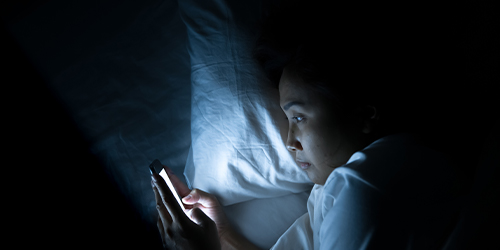One cornerstone of wellness is getting an appropriate amount of sleep. In today's world, an inadequate amount of sleep is often the byproduct of stress. The absence of sleep, especially over the long term, can contribute to significant health problems like heart disease, high blood pressure, stroke, and diabetes. It can also contribute to the signs of aging and diminished mental sharpness.
One of the surprising factors that contribute to poor sleeping patterns is exposure to too much blue light.
What Role Does Blue Light Play In Getting A Good Night's Sleep?
Your body has a built-in clock that tells your brain when to wake up and when to sleep. The clock, however, is not accurate unto itself. Blue light is the main factor in keeping the clock accurate, year-round.
Up until the modern age, humans depended on the cycles of day and night to time their waking and sleep cycles. Natural sunlight is saturated with blue light. When the sun was up, it was time to rouse for the day. When the sun went down, it was time to quiet down and get some sleep. This natural cycle helped to keep the body's circadian rhythm in balance.
Scientific studies have confirmed that blue light is the natural trigger for the wake and sleep cycle. Primitive man's use of fire at night did not interfere with this cycle. The light from fire is naturally heavy in red and orange light, not blue. This allowed man to remain active a few hours after dark, but did not interfere with his ability to get a healthy amount of sleep.
Today, our nighttime environment is saturated with blue light, disrupting our natural clocks. Modern light bulbs emit a ton of blue light, as do computer screens and TVs. All of this blue light, after nightfall, disrupts the brain's natural wake/sleep cycles. And that is why many people have troubled sleep patterns.
Are There Solutions To Blue Light Exposure?
To counteract this modern bombardment of blue light, you have to take some proactive steps.
- Use blue-light-blocking glasses at night.
- Use blue light-blocking programs on your computer.
- Turn off the lights 1 to 2 hours before bedtime.
- Use red or orange reading lamps, which don't emit blue light.
- Keep the bedroom completely dark.
- Use a sleep mask.
- Get plenty of blue light exposure during the day.
Getting a good night's sleep is part of a healthy lifestyle. It improves emotional, mental, and physical states. If you want to learn more about the restorative powers of sleep, contact the health and wellness experts at Matrix Age Management in Amarillo.






